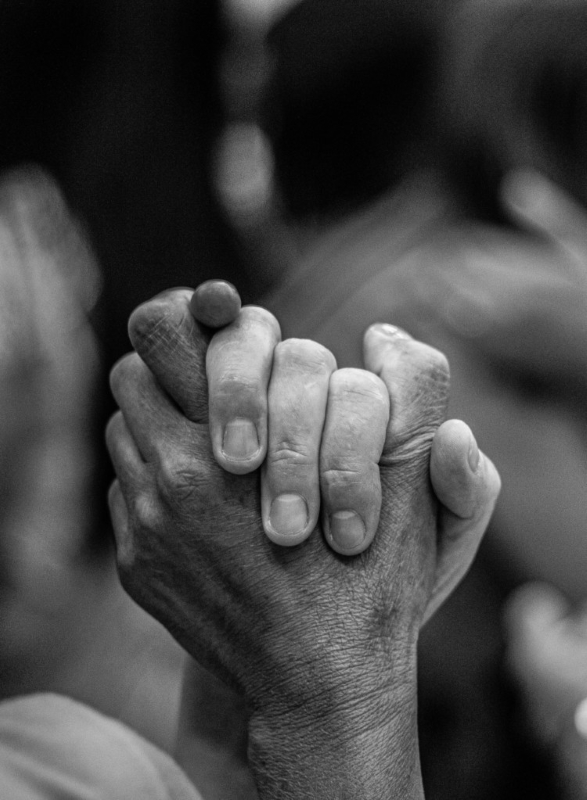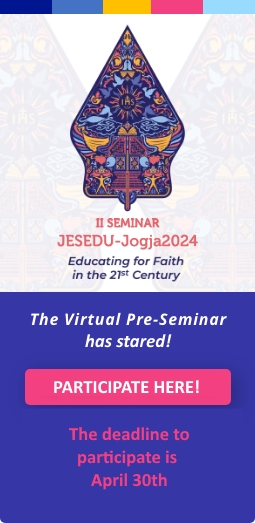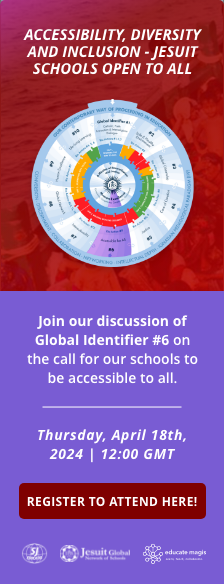 On May 15th we announced the beginning of a unique opportunity for Jesuit Educators around the world, an opportunity to be part of a global virtual reflective journey on themes central to our Jesuit Education today. Guided by pre-recorded Keynotes, members of our global community have been exchanging thoughts, opinions, and ideas on the topics of “Educating for Faith” and “Educating for Depth”. These are two of four Strands, which will be available for participation until June 28th as part of the JESEDU-Global 2021 Pre-Colloquium experience.
On May 15th we announced the beginning of a unique opportunity for Jesuit Educators around the world, an opportunity to be part of a global virtual reflective journey on themes central to our Jesuit Education today. Guided by pre-recorded Keynotes, members of our global community have been exchanging thoughts, opinions, and ideas on the topics of “Educating for Faith” and “Educating for Depth”. These are two of four Strands, which will be available for participation until June 28th as part of the JESEDU-Global 2021 Pre-Colloquium experience.
This week we would like to invite you to start a new reflective journey on another crucial topic which is also central to our Jesuit Education, “Educating for Reconciliation”. This is the theme for Strand #3 of the JESEDU-Global2021 Pre-Colloquium Asynchronous Reflection Modules. This Strand raises the questions how can we as educators prepare our students to become agents of reconciliation in a world of increasing polarization and fragmentation? and how can our schools be sanctuaries of reconciliation?
To participate in Strand #3 please login to the Colloquium Hub here.
We will open the last Strand next week, and remember, you have until June 28th to watch the Keynote Addresses and engage in the online conversations for all 4 Strands!
For the past two weeks participants have been increasingly sharing their insights on these thought provoking topics. The keynotes have awoken, for some, a desire for further reflection and have raised even deeper questions, such as;
How are we to teach our young people to live true to the person they are created to be?”,
How [do] we live and witness our Catholic faith in our daily life in our education institution?”.
For others, they have inspired interesting and powerful reflective statements and conclusions, such as;
To live the Preference, it is necessary to have an attitude of listening to the realities of young people and from there to be able to give a focus of hope”,
Education for faith means fostering a world vision from within. Jesuit Education passes the test when we form individuals who will decide for themselves and not from what is the latest and newest fashionable set of ideas”,
and “Children and young people are not the future, but the present, and this must be demonstrated in the citizenship in which they participate. Educating them to think that they are the future means taking away their value, transferring responsibility to an uncertain future that we do not know when it will arrive”.
The Global Pandemic has emphasized the need–more than ever–to think critically, to evaluate diverse and conflicting claims and sources, against the prevailing copy-and-paste culture and allergy to nuance and complexity and it has underscored every person’s fundamental need for a meaning and purpose of one’s life. In Strands 1 and 2 of this Pre-Colloquium we are invited to take some time to find the ways to tackle these issues, together, as a global community. The JESEDU-Global2021 Pre-Colloquium is setting out an space for us, Jesuit Educators, to nurture the future of our Jesuit Education by putting our educational expertise into play to look for possible solutions on “How to Educate for Faith” and “How to Educate for Depth”. Have you participated yet? If not we invite you to login to the Colloquium Hub here and contribute to these important online conversations.
Here are some excerpts of some reflections shared in Strand 1 and 2. To read more and participate please login to the Colloquium Hub here
Strand 1
“The invitation to focus more on experiences and reflection than on doctrine is key.” José Francisco Aranguren, Barcelona, Spain
“Diversity in general teaches us that there are many ways, many paths to seek spirituality but ultimately we all persue the same thing.” Andrea Rodrigues, Coordinator, Colégio São Luís, Brazil
“The thought provoking presentation invites all of us to a deeper reflection of “How we live and witness” our Catholic faith in our daily life in our education institution. I think that more than any other way of educating for faith, it will be our witness to faith which will carry deeper impressions on our students.” George Nedumattam. Principal, St. Xavier’s Higher Secondary School, India
“As teachers, followers of Ignatian pedagogy, this reflection leads us to rethink our mission, which goes beyond the curricular content and beyond the boundaries of the classroom. We are called to develop an ecological ethic, educating through coherence between word and life;” Ligia Victoria Gévez, Teacher, Colegio San Pedro Claver, Colombia
“In keynote 1, Fr. Hanvey speaks about faith from two different approaches, which I call anthropological and theological levels. The way I see it, in keynote 2, however, Fr. Orobator speaks only about the anthropological level. Both keynotes helped me strenghten one convicition, that is: Education for faith means fostering a world vision from within. Jesuit Education passes the test when we form individuals who will decide for themselves and not from what is the latest and newest fashionable set of ideas.” Eduardo Henriques, SJ, Advisor to the Board of Directors, Colégio Loyola, Brazil
“To educate for faith is to educate for tolerance and for the awareness that the other is important for me and for God. To see all things through the lens of faith… is a great challenge, but it is important to be able to focus the efforts of our schools on this perspective.” José Quintero, Teacher, Colegio Cristo Rey, Paraguay
“As educators of 10-12 year olds, we are attracted by the idea that they are responsible for and contributors to the faith culture of the school, without realising it. The statement that children and young people are not the future, but the present, and this must be demonstrated in the citizenship in which they participate, makes sense. Educating them thinking that they are the future means taking away their value, transferring responsibility to an uncertain future that we do not know when it will arrive. The actions of young people around the world during the pandemic, where we saw how they either served the older members of their communities or, on the contrary, showed selfish attitudes towards them, are proof of this.”David Vázquez Luna, Colegio San Ignacio, Oviedo, Spain
Strand 2
“One of the questions that invites me to take a break is: How are we going to teach our young people to live being faithful to the person they have been created to be? This is a challenge for educators, and we must be prepared for it, not only to accept generational changes, but also to be assertive when accompanying each generation in their decision making process.” Ana Luisa Pineda, Teacher, Colegio Externado de San José, El Salvador
“How many biblical passages can we bring to mind from this beautiful talk? To educate for depth is not to stay on the simple shore and wait for things to happen, it is to go beyond, to where God’s will guides us to take and be part of making things happen. Fully convinced that educating for depth requires making wise decisions, I ask myself: How do we know what these are, or how do we know how to ask God for them in order to guide young people to discover and sing their own song?” Alfonso Torres, Instituto Oriente de Puebla A.C., Pedagogy Teacher, México
“Thank you for these wonderful reflections. Your reminder that “chaos, not order, is the raw material of new creation” is so important for our uncertain times.” Robert Stephan, Director of Ignatian Formation and Adult Spirituality, Loyola High School L.A., United States of America
“From chaos and confusion spring forth clarity and creation. Problems give birth to possibilities towards solution. One possible way of bringing about this awareness (to be in touch with the depth) among our students is the Examination of Conscience, systematically programmed and executed in our schools everyday for both staff and students.” John Kennedy, Head Master, St. Xavier’s Hr. Sec. School, India
“In order to live the Preference, it is necessary to have an attitude of listening to the realities of young people and to be able to give them a focus of hope, and above all to be able to attune them to love and truth. It is to guide them from the recognition of their particular situations to the truth and hope that emanate in freedom and decisions.” Lidia Murcia, Colegio Mayor de San Bartolomé, Colombia

